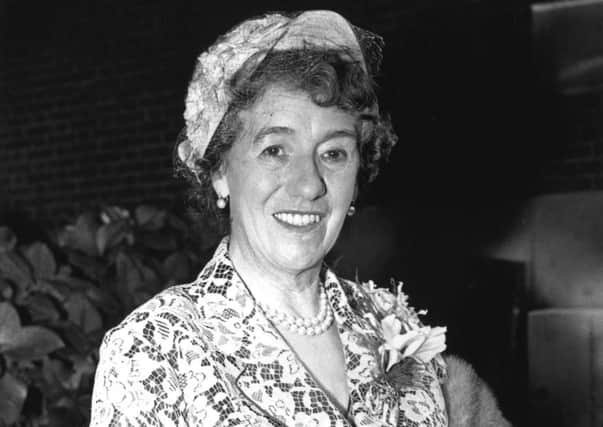Enid Blyton’s racism needs to be challenged – Laura Waddell


If Enid Blyton being commemorated on a coin wasn’t a real prospect, albeit now ruled out by the Mint as reported to much consternation, it would be a little too on the nose as a metaphor.
Money makes the world go round, after all. Currency is what we trade with. There are statues to racists all over the country, looking over public places, surrounded by buildings built by slave trade profits.
Advertisement
Hide AdAdvertisement
Hide AdValorising a racist author accused of racism would only be the latest in a long line of tributes to those who rose to the top of a country literally and physically built on inequality. In 2019, Britain can no longer plead ignorance. We cannot put racism on our money. But we could start examining more closely who in our society is valorised, and how the stories we tell about Britain as tea-drinking and mannered have obscured violent colonial realities and ideas.
I loved Enid Blyton books when I was little. I devoured as many as I could get my hands on, mostly from the Famous Five and Secret Seven series, and they impacted my world view on what a picnic should be comprised of (ginger beer, obviously), what adventure looks like (islands, spies, and boats), and more. I inherited old copies from older family members, checked them out of the library by the dozen, and rummaged for them in car boot sales. I’ve heard few ideas more exciting to the imagination than the Magic Faraway Tree, and all the lands it offered access to – tables laden with impossible and sweet foodstuffs, and topsy turvy places which askew gravity, padded with pillows.
But none of those reading memories stop me from recognising the racism too, which I didn’t truly take stock of until a bit later in life, and which in some cases has been edited out to make contemporary editions more saleable.
There may no longer be golliwogs on the pages, but children are still not reading books which reflect modern Britain, with ethnic minority lead characters lingering at around 1 per cent. The bold and overt racism in Blyton’s books was overlooked for so long because it was wrapped up in a benign and charming package of storytelling.
The world is changing, but very slowly. Slowly enough that Enid Blyton’s racism was discussed decades ago, and the conversation is still rumbling on. When the prolific writer was considered the quintessential children’s author, which has largely endured in sentimental legacy (as well as a blue plaque, and other honours), the post-war racial makeup of Britain was evolving.
In 1966, the Guardian criticised Blyton’s book The Little Black Doll, which includes the phrase “ugly black face,” with a character whose black skin colour was washed away by rain. A manuscript considered too xenophobic was rejected by publisher Macmillan in 1960, later picked up by William Collins. These conversations were had decades ago, but many in the present day seem completely unable to handle questioning racism at all.
It is testament to collective modern vanity and disinterest in history that many believe we are in an unprecedented age of ‘moral outrage,’ when really what we are witness to is an era where the range of voices in the public domain is broadening and social attitudes are being challenged and changed.
When those impacted by racism and sexism share concerns, it’s often interpreted in bad faith, not only by career controversialists with a tired but still profitable line in poking fun at millennials, but often also by many ordinary people taking defensive positions over their own ‘free speech,’ which is more accurately the demand not to face criticism, and a desire to preserve a past hostile to minorities.
Advertisement
Hide AdAdvertisement
Hide AdThose who feel blood pressure rising at the idea a person or a thing might be scrutinised for its racism believe themselves to be personally and deeply maligned by a world in which other people matter, and which they have to share. The implicit suggestion that a moral position should be taken on racism and sexism is viewed as a compromise of their own freedom to engage with all the world has to offer, unimpeded and tailored specifically to their own image.
That corporate and editorial boards across art, entertainment, and media of all kinds, as well as dominant forces in politics and finance are still overwhelmingly skewed towards one demographic, does not factor into the fear some seem to hold that when racism (or sexism, or homophobia) is held accountable it is a step towards their own erasure from the world. If those stamping their feet are not at the top of the food chain (white, wealthy, and male), it’s the standard they identify with and shelter under, all others be damned.
Forget knee-jerk reaction on Twitter, often held up as evidence of persecution – there is often no more pervasive and deeply rooted desire to shut down nuance than when criticism of racism challenges long-held and widely represented views on one’s place in the world. All perspective is lost, and phone-ins pander to self-centred hysteria. Imagine if white people perpetually clinging to the past faced the societal exclusion others actually do on a day-to-day basis, rather than merely experiencing challenge to views that are anti-social and hateful?
What we’re really debating now isn’t at all about whether you or I had the right to enjoy a children’s book 20, 40 or 60 years ago. The real issue is about how honest Britain is able to be about its history, and how racism and nationalist self-mythologising has shaped our society. It’s about seeing who is invested in dampening down criticism of racism now, and reflecting on why that is. Ultimately, our decisions of who we valorise today are a test of whether or not society is moving in the right direction.